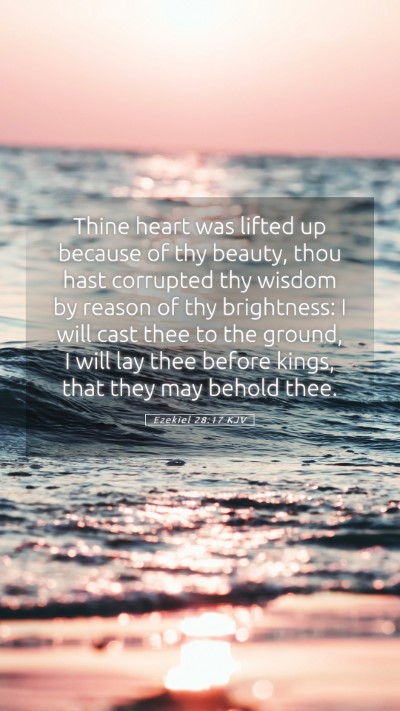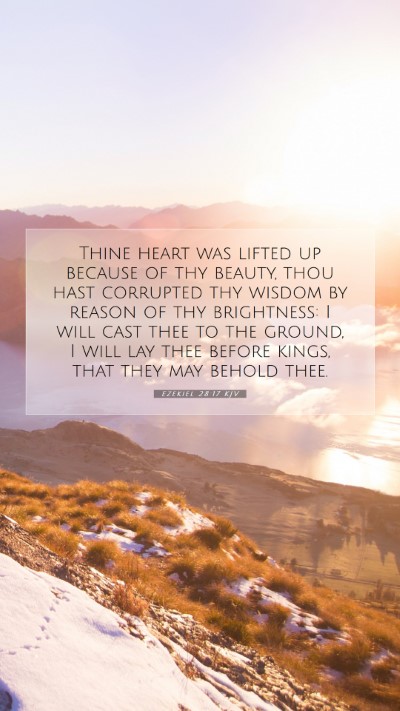Ezekiel 28:17 - Understanding the Verse
Ezekiel 28:17 states: "Your heart was lifted up because of your beauty; you corrupted your wisdom for the sake of your splendor. I cast you to the ground; I laid you before kings, that they might gaze at you."
This verse is part of a passage that speaks of the downfall of the King of Tyre, often interpreted as a reflection of Satan's pride and eventual fall. Various public domain commentaries delve into the rich meanings behind this verse, shedding light on its significance in understanding biblical themes of pride, beauty, and judgment.
Bible Verse Commentary Insights
The commentaries by Matthew Henry, Albert Barnes, and Adam Clarke suggest several interpretations:
-
Matthew Henry emphasizes the danger of pride:
He points out that the King of Tyre's beauty and wisdom led to arrogance, illustrating a timeless principle where greatness can corrupt and lead to downfall. This commentary invites readers to reflect on the importance of humility and dependence on God.
-
Albert Barnes focuses on the judgment aspect:
Barnes notes that the verse illustrates how beauty and wisdom, if not grounded in godliness, can lead to disastrous consequences. Tyre's king was metaphorically cast down, serving as a warning to those who prioritize pride over devotion to God.
-
Adam Clarke provides a deeper historical context:
Clarke discusses how this passage not only critiques the literal figure of the King of Tyre but is also seen as a typological reference to Satan himself. This commentary examines the symbolic nature of the text and its application throughout history, offering insights into the spiritual battles faced by believers.
Meaning and Application
The essence of Ezekiel 28:17 highlights a spiritual truth relevant in both ancient and modern contexts: the temptation of pride and the cost of losing one's alignment with divine purpose.
The verse encourages Bible study groups to explore the frailty of human wisdom when divorced from the reverence of God. As in the case of the King of Tyre, personal attributes can lead to self-deception. Thus, understanding Scripture involves recognizing our vulnerabilities and the need for continual humility.
Scripture Analysis and Cross-References
To enhance the analysis of Ezekiel 28:17, the following cross-references are pertinent:
- Isaiah 14:12-15: The fall of Lucifer parallels the theme of pride leading to destruction.
- Proverbs 16:18: "Pride goes before destruction," reinforcing the consequences of arrogance.
- 1 Peter 5:5: Encouragement to clothe oneself with humility, opposing the mindset of pride.
Historical Context
Understanding the historical context of Ezekiel’s message provides layers to its meaning. The King of Tyre would have been considered powerful during his reign, symbolizing wealth, beauty, and wisdom in the ancient world. Yet, this passage serves as a reminder that no earthly power is beyond the reach of divine judgment.
Conclusion
In conclusion, Ezekiel 28:17 carries profound implications for Bible study insights and personal reflection. The interplay between beauty, wisdom, and pride serves as a cautionary tale against self-exaltation.
As you study this verse, consider its relevance to your own life and the timeless truths it offers about humility and reliance on God. Remember that the significance of Bible verses often transcends their historical context, resonating with the experiences and struggles of believers today.
Engage with this passage through online Bible study, utilizing various Bible study tools and resources to dive deeper into your understanding of Scripture. The quest for meaning in Scripture is enriched by community study and personal meditation on its teachings.


